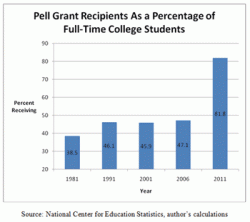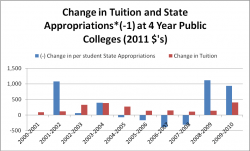
In the first couple weeks of any survey course in the principles of economics, students are taught that prices are determined by the interactions of consumers (demand) and producers (supply). Prices for many things, such as oil, or of common stocks, constantly change with the frequent shifts in the willingness of consumers and producers to […]
Read More
Is it true that only some recipients of student loans are getting their money’s worth–those with “majors closely aligned with actual occupations” such as engineers or computer scientists? Daniel Foster of National Review Online makes that argument in The American Spectator. These students, he says, are more employable and earn more upon leaving college than […]
Read More
Many politicians, including senators such as Tom Harkin and Dick Durbin, have grown indignant over the allegedly vast amounts of higher education money captured by for-profit institutions via the Pell Grant program. In fact, they consider this something of a scam. The truth, of course, is that throughout its history, including now, the vast majority […]
Read More
The current conversation on higher ed reform coming is unusually platitudinous even for an election year. This was clearest earlier this year during the battle between Barack Obama and Mitt Romney on the proposed federal student loan interest rate, a subject fairly inconsequential in larger problem of sky-high college costs. In his Democratic nomination acceptance […]
Read More
It probably had to happen. The conversion of campuses into luxurious spa-like retreats started at elite and well-heeled institutions and has now spread to smaller, lesser-known colleges. The newest student residence at Saint Leo University in Florida houses nap pods, an electronic gaming area with four flat-screen televisions, a workout area and an arcade complete […]
Read More
Concordia University in St. Paul made news by cutting regular tuition costs by a hefty 33.7 percent–$10,000–leaving students to pay $19,700 if they receive no assistance or discounts. But the reduction disguises a fact true at Concordia and at most every other private schools: up to half of undergraduates don’t pay the full fee. At […]
Read More
The vast majority of American colleges and universities make admission decisions without considering the financial need of applicants. Only a handful of private institutions admit their entire first-year class need-blind and then fully meet the financial need of all of their admitted students through a combination of grants, loans and employment opportunities. These institutions tend […]
Read More
In his acceptance speech at the Democratic National Convention last night, President Obama promised that he would “work with colleges and universities” to slow the steady rise in tuition we have experienced, cutting the rate of increase in half. Inside Higher Ed has the story. Naturally, the president’s statement drew applause from the Democratic faithful, […]
Read More
As part of its series on higher ed issues in the 2012 campaign, the Chronicle of Higher Education has a long opinion piece in the form of a news article accusing Republicans of hypocrisy. In “Self-Sufficient, With a Hand From the Government,” author Scott Carlson claims to find “a striking dissonance” between the moving “pull-oneself-up-by-the-bootstraps […]
Read More
Originally posted at Open Market The Washington Times takes note of the burgeoning higher education bubble in a recent editorial: The cost of a college education has soared far in excess of the cost of health care. This is in spite of — or, more accurately, because of — massive government involvement in subsidizing […]
Read More
Earlier this month Annette Clark, dean of Saint Louis University’s law school, abruptly resigned from her job via e-mail after only a year. She left after accusing the Jesuit university and its president, Rev. Lawrence Biondi, of looting the law school in order to fund other, non-law-related programs on the Saint Louis campus. This was […]
Read More
Now that Paul Ryan has joined the Republican ticket, it’s worth considering how his much-discussed budget changes higher education. Ryan wants to cap the maximum amount of Pell Grant awards at the current level of $5,550, eliminating the automatic increase according to inflation. Ryan would also shore up the eligibility requirements, adding a maximum income […]
Read More
How to attend UCLA on the cheap? Be an illegal immigrant. Actually, be a leftist illegal immigrant. UCLA’s Center for Labor Research and Education and the union-subsidized National Labor College in Maryland have teamed up to establish “National Dream University” for the undocumented. The tuition is low: just $65 per credit hour, in contrast to […]
Read More
Open a marketing brochure for any college or university in the United States and you’ll find an info-graphic touting the variety and number of degree programs that the institution offers. The more options, the rationale goes, the more likely a student will find a desired specialty. The distinction between programs can be subtle, for instance […]
Read More
The new Sallie Mae-Gallup survey of attitudes toward higher education, “How America Pays for College 2012,” shows that Americans are becoming increasingly resistant to rising college prices. Some people who were saying “I want the best college money can buy” a few years ago, are now saying “We aren’t going to pay sky-high tuition when […]
Read More
When asked the question, “Why do colleges keep raising tuition fees?” I give answers ranging from three words (“because they can”), to 85,000 (my book, Going Broke By Degree). Avoiding both extremes, let’s evaluate two rival explanations for the college cost explosion, followed by 12 key expressions that add more detail.
Read More
Cross-posted from Big Think. When even the judicious George Will is chiming in on an important policy issue, you just know the concern must be serious and supported by all the right studies. THE HIGHER EDUCATION BUBBLE, the thinking goes, is just like THE HOUSING BUBBLE.
Read More
Carol Todd of Nottingham, Maryland, persuaded a bankruptcy judge in Baltimore to “discharge”–that is, wipe the slate clean on–nearly $340,000 in student loan debt. The grounds were that she has Asperger’s Syndrome, a mild form of autism that apparently prevents her from getting or keeping a steady job. U.S. Bankruptcy Judge Robert Gordon ruled on […]
Read More
When Victor Hugo claimed that all the world’s armies are powerless against an idea whose time has come, he probably had in mind good ideas. But the time can come for a bad idea also. Low-cost student loans, embraced by President Obama, Governor Romney, and Congressional leaders of both parties, is a bad idea. Students […]
Read More
We have entered a new digital era that appears to have made the traditional trappings of higher education–e.g., fixed curricula, going to lectures, even physically attending a college or university–about as necessary to getting a college degree as the telegraph is for sending messages. Out with hierarchy, structure, and the top-down approach to higher education. […]
Read More
Santa Monica Community College, a public two-year institution on the Pacific coast not far from Los Angeles, has a reputation as the jewel in the crown of California’s 2.9 million-student community-college system. Known for academic excellence, Santa Monica has one of the highest transfer rates in the state to California’s elite four-year colleges public and […]
Read More
Gary Fethke’s recent op-ed Why Does Tuition Go Up? Because Taxpayer Support Goes Down in The Chronicle of Higher Education is an enjoyable read. Rather than dismiss the opposing side’s argument with straw men, as is so common these days, Fethke presents it faithfully and gives it due consideration, which is a breath of fresh […]
Read More
No modern-day Paul Revere is taking a midnight ride to warn about this, but the defaults are coming. Many are already here. They are coming from student loans given to the wrong students for the wrong reasons. The portfolio of federally guaranteed student loans passed the one trillion dollar mark in early 2012, and it […]
Read More
Some commentaries on higher education appear year after year, almost unchanged. One of these hardy perennials is the story that tuition and fees don’t come close to paying for the actual cost of educating college students. In his popular book, The Economic Naturalist, Cornell University economist Robert Frank claims that tuition payments cover only a […]
Read More
The first sentences of Jeffrey Williams’ essay in the Chronicle of Higher Education, “Deconstructing Academe: The Birth of Critical University Studies”, sounds like an introduction to the many conservative and libertarian critiques of higher education that have appeared in recent decades, starting with Allan Bloom’s The Closing of the American Mind, Martin Anderson’s Imposters in […]
Read More
“Here are some [college] degrees that cost you roughly $30,000 in tuition, their much cheaper replacements, and the savings you’d realize: Degree Replacement Savings Foreign Languages Language Software $29,721 Philosophy Read Socrates $29,980 Women’s Studies Watch Daytime TV $30,000 Journalism Start […]
Read More
It’s called “the Bennett Hypothesis,” and it explains–or tries to explain–why the cost of college lies so tantalizingly out of reach for so many. In 1987, then Secretary of Education William J. Bennett launched a quarter century of debate by saying, in effect, “Federal aid doesn’t help; colleges and universities just cream off the extra […]
Read More
When President Obama talked about unaffordable college tuition, he failed to point out that federal subsidies are responsible for much of the unaffordability. In his State of the Union message, he said, “If you can’t stop tuition from going up, the funding you get from taxpayers will go down.” However, since tuition is dependent on […]
Read More
Cross-posted from Open Market. In his State of the Union Address, President Obama decried skyrocketing college tuition, attempting to take advantage of public anger over the steadily-worsening college tuition bubble. This was ironic, since his own Administration has done much to foster rising college tuitions. For example, it imposed the 90-10 rule, which forced low-cost educational institutions to raise their tuition to […]
Read More
Last week on its “Working It Out” page, The Atlantic Monthly posed a far-reaching question: Should each college be required to prominently post consumer information for prospective students — a kind of nutrition label for higher ed?
Read More